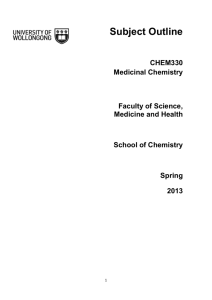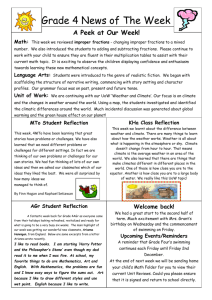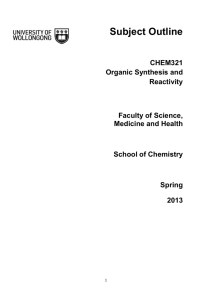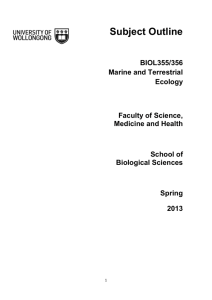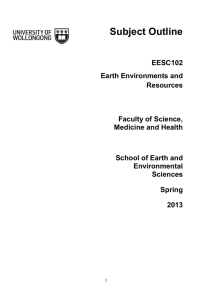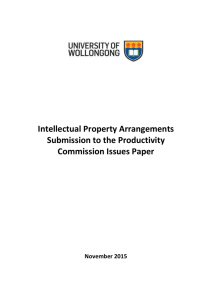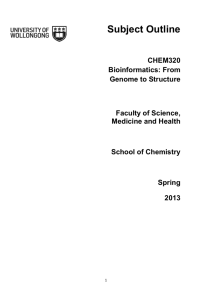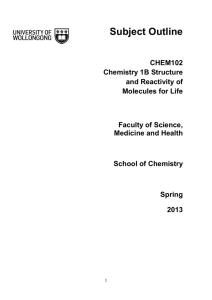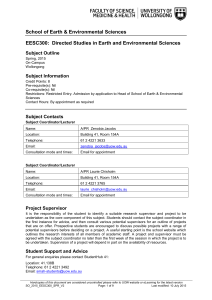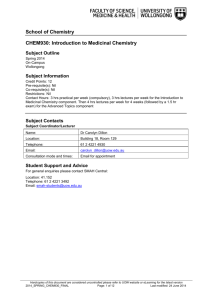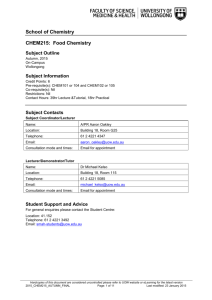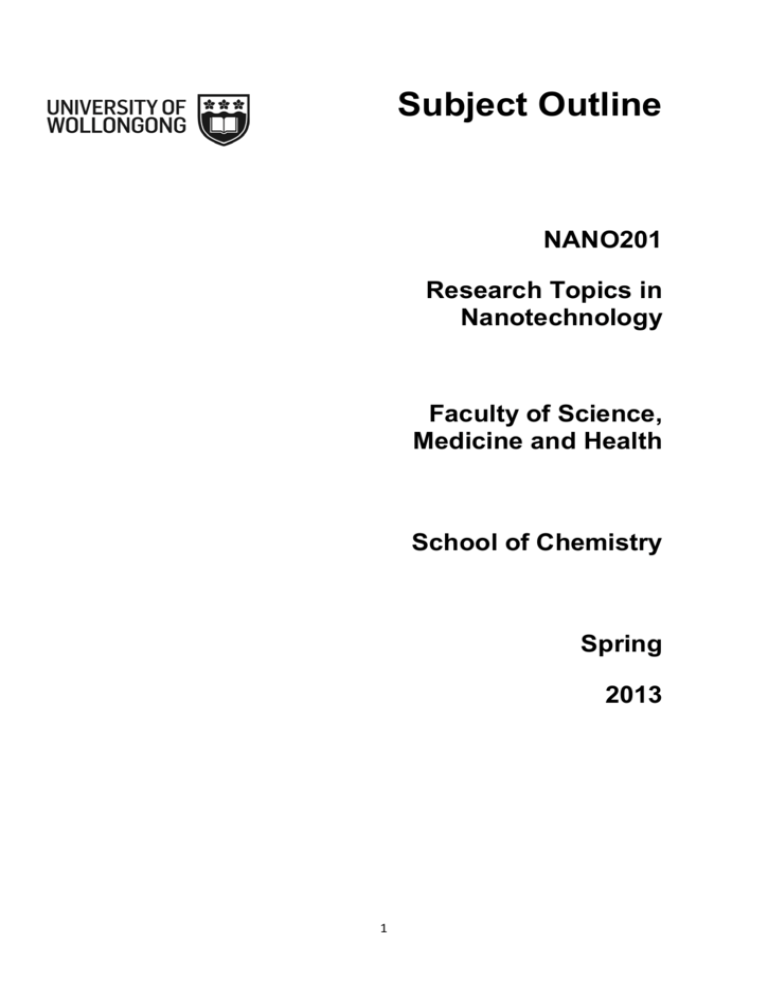
Subject Outline
NANO201
Research Topics in
Nanotechnology
Faculty of Science,
Medicine and Health
School of Chemistry
Spring
2013
1
Subject Outline
Subject code:
NANO201
Subject name:
Research Topics in Nanotechnology
Credit points:
6
Pre/co-requisites:
NANO101
Mode of delivery:
On Campus
Delivery location:
Wollongong
Version history
9th edition
Christopher Richardson, Faculty of Science, UOW. New teaching staff.
th
8 edition
Christopher Richardson, Faculty of Science , UOW
© University of Wollongong 2013. All rights reserved.
2013
2012
Copyright and Disclaimer
No part of this work may be reproduced without the prior written consent of the University of Wollongong. All requests and
enquiries should be directed to the Vice-Principal (Administration), University of Wollongong, Northfields Avenue, Wollongong
NSW 2522 Australia. Within Australia telephone (02) 4221 3920; international +61 2 4221 3920.
http://www.uow.edu.au/about/disclaimer/index.html
The University of Wollongong attempts to ensure that the information contained here is correct at the time of production,
however, sections may be amended without notice by the University in response to changing circumstances or for any other
reason.
2
Contacts
Subject Co-ordinator
Name:
Dr Christopher Richardson
Faculty of Science, Medicine and Health
Location
41.152
Telephone
Email
61 2 4221 3492
smah_student_enquiries@uow.edu.au
Consultation mode and times:
_________________________________________________________________________
Lecturers
Office
Chris Richardson
18-114
Adam Trevitt
18-224
Marc in het Panhuis
41.260c
Peter Innis
AIIM244
Michael Higgins
iC
Moeava Tehei
18.G21
Kosta Konstantinov
IC.123
Phone
Email
3254
crichard@uow.edu.au
5545
adamt@uow.edu.au
3155
panhuis@uow.edu.au
3600
innis@uow.edu.au
3989
mhiggins@uow.edu.au
4780
moeava@uow.edu.au
5765
konstan@uow.edu.au
3
Consultation times
By arrangement
By arrangement
By arrangement
By arrangement
By arrangement
By arrangement
By arrangement
Subject Information
Outline
The subject consists of a series of lectures illustrating the development of understanding of
materials behaviour at the nano-dimension; the methods for preparing nano-scale materials
and the design, fabrication and testing of nano-devices. Emphasis in this subject is on the
nanoscience and how basic studies in chemistry and materials combine and provide the
basis for understanding current research in nanotechnology. The course includes laboratory
sessions where students will prepare nanomaterials and investigate specific nanophenomena (e.g. tuned optical absorbance of nanoparticles).
Learning Outcomes
Through successful completion of this subject students will be able to:
•
•
•
•
Demonstrate an understanding of materials behaviour at the nano-dimension
Describe and carry out methods for preparing major classes of nano-materials
Discuss techniques and methodologies for the design and fabrication of assembled
nano-devices
Use various characterisation techniques to understand chemical and physical
properties of nano-materials
Faculty Graduate Qualities
Valuable qualities gained by UOW graduates are essential for gaining employment and
making an important contribution to society and their chosen field – further information is
available at http://www.uow.edu.au/about/teaching/qualities/
Engagement in this subject will contribute to each student’s development of the following
UOW Graduate Qualities:
Informed
• Comprehensive knowledge of an area of Science and well-developed skills in using
relevant technologies
• Awareness of the international context in which advances in Science are made and
applied
Independent learners
• Critical thinking skills
• Scientific approach to the acquisition, analysis, and interpretation of data
Independence in seeking to extend knowledge through ongoing research, enquiry and
reflection
• Problem solvers
• Application of creative, logical and critical thinking to scientific problems
4
Effective communicators
• Well-developed written, oral & aural communication
• Effective collaboration and teamwork across a range of settings and cultures
Responsible
• Ethical decision making
• Respect for diverse opinions, professions, and cultures
5
Lecture/Tutorial/Laboratory Times
Refer to http://www.uow.edu.au/student/timetables/index.html for an up-to-date timetable.
Activity
Day
Start
Finish
Lecture A
Mon
13.30
15.30
Lecture B
Tue
09.30
10.30
Laboratory
Mon
09.30
12.30
* Any guest lecture locations and times are to be advised
Location
1.G01
1-G01
41-340
Weeks
All weeks
All weeks
1-9
Study Time
Students should note that UOW policy equates 1 credit point with 2 hours of study per week
that includes lectures and tutorials. For example, in a 6 credit point subject, a total of 12
hours of study per week is expected.
Prescribed Reading
There are currently no prescribed readings
Recommended Readings
Students will be advised of any recommended readings by lecturers. The recommended
readings are not intended as an exhaustive list and students should use the Library
catalogue and databases to locate additional resources.
Materials
For the laboratory course students must wear a laboratory coat, covered footwear and safety
glasses at all times.
e-Learning
This subject has materials available via eLearning. To access eLearning you must have a
UOW user account name and password, and be enrolled in the subject. eLearning is
accessed via SOLS (student online services). Log on to SOLS and then click on the
eLearning link in the menu column.
For information regarding the eLearning spaces please use the following links:
Blackboard Vista - http://www.uow.edu.au/student/elearning/vista/index.html.
Moodle - http://uowblogs.com/moodlelab/files/2013/05/Moodle_StudentGuide-1petpo7.pdf
6
Lecture Schedule or Topic List
MP: Marc in het Panhuis; PI: Peter Innis; AT: Adam Trevitt; CR: Chris Richardson; MH: Michael Higgins; KK:
Kosta Konstantinov; MT: Moeava Tehei
Week
(starting)
1 (29 July)
2 (5 August)
3 (12 August)
4 (19 August)
5 (26 August)
6 (2 Sept.)
7 (9 Sept.)
8 (16 Sept.)
9 (23 Sept.)
(24 Sept)
10 (7 Oct.)
11 (14 Oct.)
12 (21 Oct.)
13 (28 Oct.)
Lecture A
Location: 1.G01
Mondays
13.30-15.30
13.30: Introduction (CR)
14.30: Quantum effects (AT)
13.30: Quantum dots (CR)
14.30: Quantum effects (AT)
13.30: Surfaces (PI)
14.30: Quantum effects (AT)
13.30: Surfaces (PI)
14.30: Characterisation (PI)
13.30: Nanoceramics (KK)
14.30: Characterisation (PI)
13.30: Nanoceramics (KK)
13.30: Nanoceramics (KK)
14.30: Nanohealth (MT)
13.30: Nanohealth (MT)
13.30: Nanohealth (MT)
MID-SESSION RECESS
Holiday
13.30: AF Microscopy (MH)
14.30: Presentation help
(CR)
13.30: AF Microscopy (MH)
14.30: Presentation help
(CR)
13.30: Presentations
Lecture B
Location: 1.G01
Tuesdays
09.30-10.30
Laboratory
Location: 41.340
Mondays
09.30-12.30
Quantum dots (CR)
Laboratory
Quantum dots (CR)
Laboratory
Surfaces (PI)
Laboratory
Characterisation (PI)
Laboratory
Quiz
Laboratory
Nanotubes (MP)
Laboratory
Nanotubes (MP)
Laboratory
Nanotubes (MP)
Laboratory
Laboratory
Nanotubes (MP)
AF Microscopy (MH)
Presentations
7
Assessment
Minimum attendance requirements
Students must attend all laboratory sessions. Students must attend all presentations.
Minimum performance requirements
Students need to complete each component at the level specified.
Component
Minimum Standard
Final Examination
200 level – 45%
Quiz
Completion of the quiz
Literature Report
Submission of a report
Laboratory
Full participation in sessions and
submission of a report
Presentation
Completion of a presentation
Students who do not meet the minimum performance requirements as set out in the Subject
Outline may be given a Fail grade or TF (Technical Fail) grade on their Academic Transcript.
See
the
General
Course
Rules
at http://www.uow.edu.au/handbook/generalcourserules/index.html
Summary
Task
Title
Weighting
Due Date
Assessment 1
Assessment 2
Assessment 3
Assessment 4
Quiz
Research Report
Literature Report
Presentation
15
15
15
10
Assessment 5
Examination
45
27th August, 09.30
27th September, 14.30
18th October, 14.30
28th October, 13.30 and
29th October, 09.30
Spring Exam period
8
Performance grades
HD
D
C
P
PS
F
TF
High Distinction
Distinction
Credit
Pass
Pass Supplementary
Fail (unsatisfactory completion)
Technical Fail
85–100%
75–84%
65–74%
50–64%
50%
0–49%
No mark recorded
Scaling
Marks awarded for any assessment task (including examinations) may be subject to scaling
at the end of the session by the Unit Assessment Committee and/or the Faculty Assessment
Committee (FAC). Marks will only be scaled to ensure fairness/parity of marking across
groups of students. Scaling will not affect any individual student’s rank order within their
cohort.
For
more
information
refer
to
Assessment
Guidelines
–
Scaling http://www.uow.edu.au/about/policy/UOW058609.html
Submission and Return of Assessment Items
Task
Title
Submission Method
Return Method
Assessment 1
Assessment 2
Assessment 3
Assessment 4
Assessment 5
Quiz
Research Report
Literature Report
Presentation
Examination
Hard Copy
SMAH Central
SMAH Central
Audio visual
Hard copy
In class
SMAH Central
SMAH Central
N/A
Assignments submitted through SMAH Central must be submitted by 14.30 hrs (2:30 pm)
before or on the final day for submission to guarantee being recorded as submitted on time.
Assignments submitted to SMAH Central will be returned by SMAH Central. Uncollected
assessment tasks will be destroyed 21 days after the release of marks for that session.
Students are advised to keep an electronic or hard copy of all submitted assessment tasks
except in circumstances where this is not possible e.g. where the task is submitted at the
end of activity in which it was completed.
Submitting an assignment at SMAH Central
Assignments submitted at SMAH Central MUST have a SATS (Student Assignment
Tracking System) coversheet attached to the front of the assignment. Instructions for
generating a coversheet can be found on the SMAH Central web page.
For an assignment to be successfully submitted at SMAH Central please note the following:
•
The coversheet must be signed and dated
9
•
•
•
The assignment must have the correct coversheet i.e. the correct subject code and
tutorial group (if applicable)
A legible barcode with all numbers and digits below e.g. UOW20121007656
Assignments must be submitted by 2.30pm on the due date
If an assignment is submitted to SMAH Central without any of the above we will contact you
and advise that you need to return to SMAH Central with the correct coversheet. Your
assignment won’t be recorded as being submitted until the correct coversheet is attached.
This might mean that the assignment is recorded as being submitted late.
Late Submission
All assessment tasks are to be submitted on or before the due dates as specified in this
Subject Outline. Assessment tasks submitted late will be penalised by the deduction of 10%
of the maximum possible mark for the assessment task per calendar day or part thereof.
Deduction of marks will not result in a negative mark.
Note that assessment tasks submitted to SMAH Central must be submitted by 2:30 pm on
the due date to guarantee being recorded in SATS as being submitted on time.
Academic Consideration including Extensions of Time
Applications from students for academic consideration should be made only on the grounds
of serious or extenuating circumstances. Applications for academic consideration are
governed
by
the
University’s
Student
Academic
Consideration
Policy
at http://www.uow.edu.au/about/policy/UOW058721.html
Do not assume that an application for special consideration will be automatically granted.
Supplementary Assessments
Supplementary assessment may be offered to students who receive a mark of 48% or 49%,
and are otherwise identified as meriting an offer of a supplementary assessment. The form
of supplementary assessment will be determined at the time the offer of a supplementary
assessment is made. For more information refer to the Supplementary Assessment
Guidelines http://www.uow.edu.au/content/groups/public/@web/@gov/documents/doc/uow1
12335.pdf.
Note that if you are offered a supplementary examination as the supplementary assessment
that you will need to sit the examination in the supplementary examination period.
Referencing
The American Chemical Society referencing system is used in NANO201. Details on this
referencing system will be provided to students. Failure to document adequately and fully is
to ignore scholarly rules – and run the risk of plagiarism.
Please
consult
the
UOW
library
website
for
further
information: http://public01.library.uow.edu.au/refcite/style-guides/html/
10
Plagiarism
Students are responsible for submitting original work for assessment, without plagiarising or
cheating, abiding by the University’s policy on plagiarism as set out in the University
Handbook under the University’s Policy Directory. Plagiarism has led to expulsion from the
University.
The University’s Academic Integrity and Plagiarism Policy, Faculty Handbooks and subject
guides clearly set out the University’s expectation that students submit only their own original
work for assessment and avoid plagiarising the work of others or cheating. Re-using any of
your own work (either in part or in full) which you have submitted previously for assessment
is not permitted without appropriate acknowledgement. Plagiarism can be detected and has
led to students being expelled from the University.
The use by students of any website that provides access to essays or other assessment
items (sometimes promoted as ‘resources’) is extremely unwise. Students who provide an
assessment item (or provide access to an assessment item) to others, either directly or
indirectly (for example by uploading an assessment item to a website) are considered by the
university to be intentionally or recklessly helping other students to cheat. This is considered
academic misconduct and students place themselves at risk of being expelled from the
University.
http://www.uow.edu.au/about/policy/UOW058648.html
11
Assessment Tasks
_________________________________________________________________________
Task 1:
Quiz
Due Date:
27th August, 09.30
Weighting:
15
Details:
An in class quiz will be held
Criteria for assessment:
questions.
Marks are allocated for correctness toward answers to the
Task 2:
Research Report
Due Date:
27th September, 14.30
Weighting:
15
Details:
A research report featuring an executive summary of length 4
or so pages A4 with an additional document of supplementary
information that contains experimental results and data based
on the laboratory component must be completed. The report
will be submitted in assigned groups.
Criteria for assessment:
Marks are allocated according to the performance of the
student during the laboratory sessions and the contribution
made towards preparing the report. The report is analysed for
presentation, clear writing and spelling, information content
and critical analysis.
Task 3:
Literature report
Due Date:
18th October, 14.30 hrs
Weighting:
15%
Details:
A literature report of length 5 pages A4 (including references
and web-links) on a piece of assigned literature must be
completed and submitted individually.
Criteria for assessment:
Marks are allocated for presentation, correct referencing, clear
writing and spelling, information content and thoroughness.
12
Task 4:
Presentation
Due Date:
28th October, 13.30 hrs, and 29th October, 09.30 hrs
Weighting:
10%
Details:
Each student will individually prepare and deliver a PowerPoint
presentation based on a research paper. The presentation
should highlight the following: the research objectives;
methodology followed; results; interpretation; outcomes and
conclusions. The time for the presentation is 8-10 mins (about
8 slides) with 2-3 minutes for questions and will be partly peerassessed.
Marks will be allocated on the performance of the presenter
and on the quality of the audio visual presentation itself.
Criteria for assessment:
Task 5:
Final Examination
Due Date:
Spring exam period
Weighting:
45%
Details:
Criteria for assessment:
Marks are allocated for correctness toward answers to the
exam questions.
13
General Advice
Students should refer to the Faculty of Science, Medicine and Health website for information
on policies, learning and support services and other general advice.
Use of Electronic Devices in Timetabled Activites
Ensure that mobile phones are turned off or turned to silent before timetabled activities.
Electronic devices including mobile phones and portable MP3 players should not be
accessed during timetabled activities unless otherwise advised.
14


